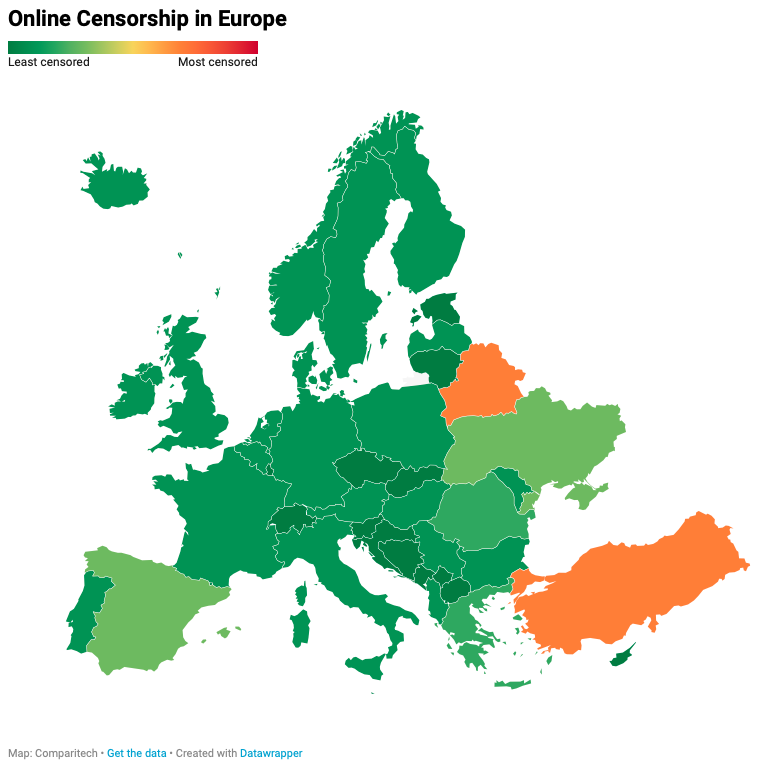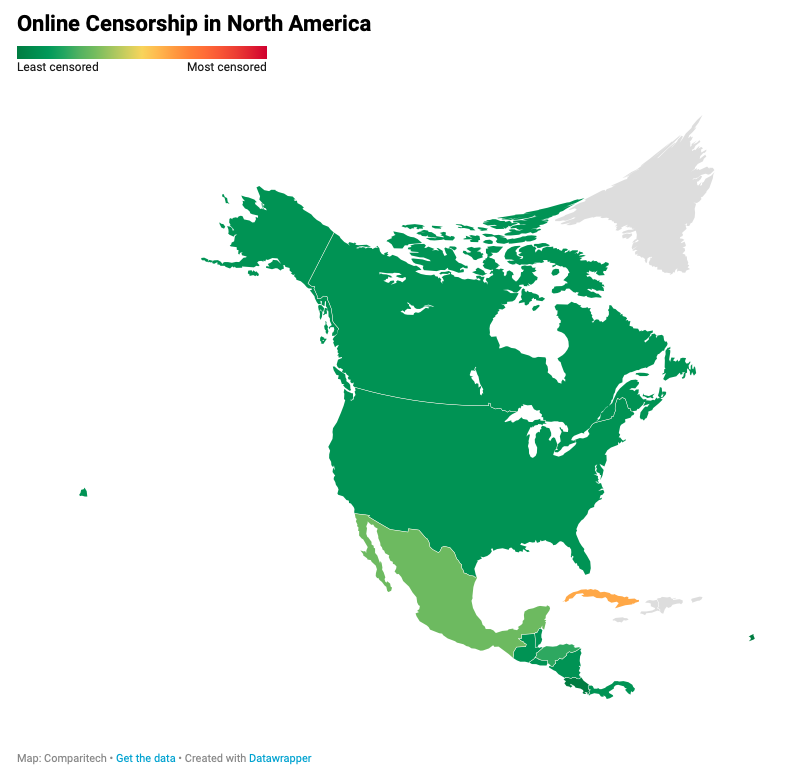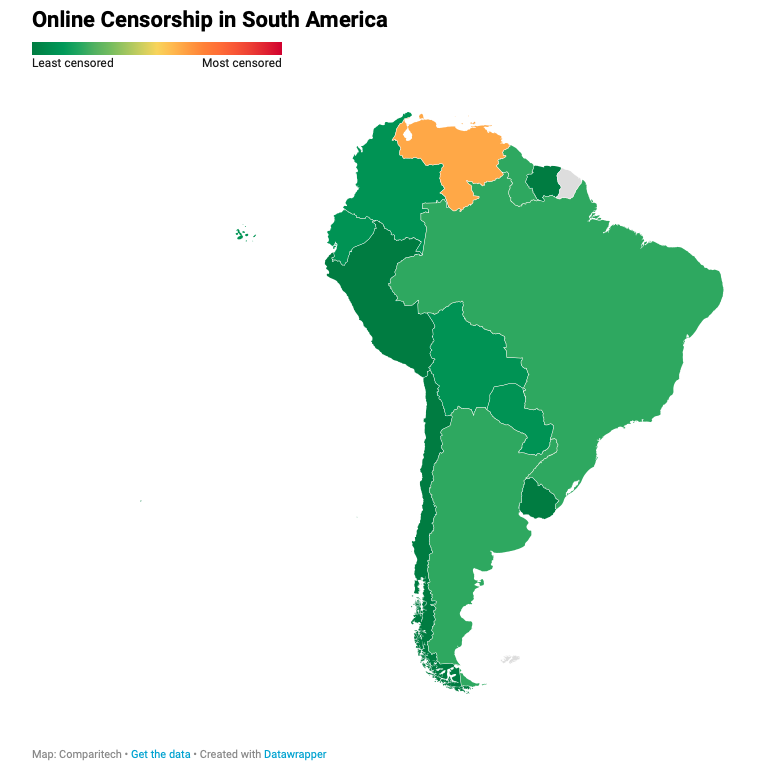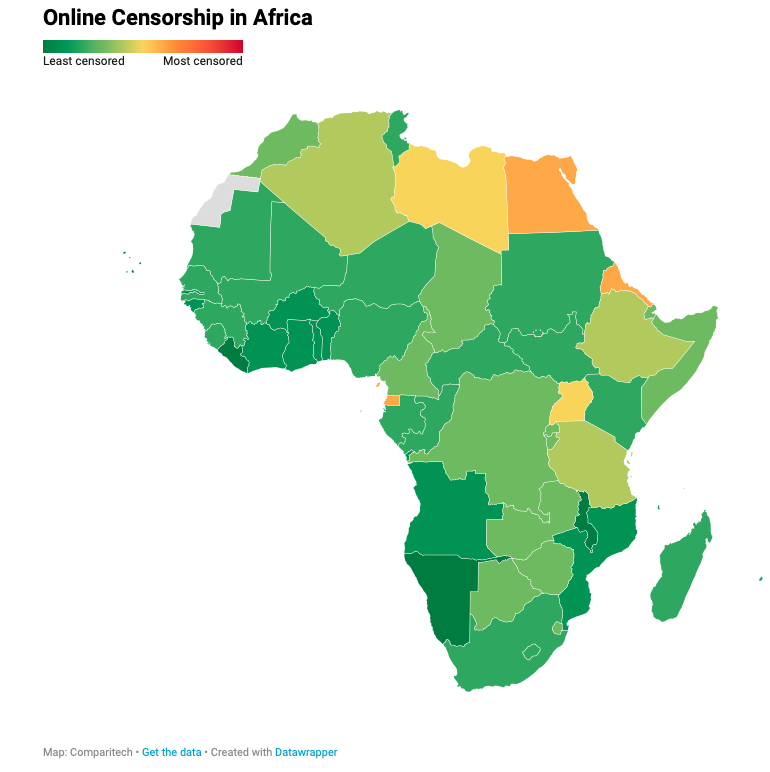Internet Censorship 2022: A Global Map of Internet Restrictions
Fri 11:09 am +01:00, 18 Nov 2022Internet Censorship 2022: A Global Map of Internet Restrictions
Interested in learning how your country compares to the rest of the world on internet censorship? We’ve broken down every country’s online restrictions into an easy-to-read guide.

All Global Research articles can be read in 51 languages by activating the Translate Website button below the author’s name.
To receive Global Research’s Daily Newsletter (selected articles), click here.
Follow us on Instagram and Twitter and subscribe to our Telegram Channel. Feel free to repost and share widely Global Research articles.
***
More than 60 percent of the world’s population (5.03 billion people) uses the internet. It’s our source of instant information, entertainment, news, and social interactions.
But where in the world can citizens enjoy equal and open internet access – if anywhere?
In this exploratory study, our researchers have conducted a country-by-country comparison to see which countries impose the harshest internet restrictions and where citizens can enjoy the most online freedom. This includes restrictions or bans for torrenting, pornography, social media, and VPNs. Also whether there are restrictions or heavy censorship of political media and any additional restrictions for messaging/VoIP apps.
Although the usual culprits take the top spots, a few seemingly free countries rank surprisingly high. With ongoing restrictions and pending laws, our online freedom is at more risk than ever.
We scored each country on six criteria. Each of these is worth two points aside from messaging/VoIP apps which is worth one (this is due to many countries banning or restricting certain apps but allowing ones run by the government/telecoms providers within the country). The country receives one point if the content—torrents, pornography, news media, social media, VPNs, messaging/VoIP apps—is restricted but accessible, and two points if it is banned entirely. The higher the score, the more censorship.
The worst countries for internet censorship
- North Korea and China (11/11): Once again, these two countries are at the top of the list with the highest score possible. There isn’t anything either of them doesn’t heavily censor thanks to their iron grip over the entire internet. Users are unable to use western social media, watch porn, or use torrents or VPNs*. And all of the political media published in the country is heavily censored and influenced by the government. Both also shut down messaging apps from abroad, forcing residents to use ones that have been made (and are likely controlled) within the country, e.g. WeChat in China. Not only does WeChat have no form of end-to-end encryption, the app also has backdoors that enable third parties to access messages.
- Iran, Myanmar, Turkmenistan, and UAE (9/11): In second place this year are Iran, Myanmar, Turkmenistan, and the UAE. Iran claws back two points due to it not completely banning torrenting or VPNs. That said, the government is trying to implement a “legal VPN” scheme in which individuals will have to apply for a VPN connection, meaning a high level of control and monitoring from the government.Turkmenistan and the UAE both gained a point for added censorship this time around. Turkmenistan now bans VPNs and people have even been forced to swear on the Koran that they will not use one, while the UAE has upped its crackdown on illegal torrenting.But it’s Myanmar that has seen one of the worst declines with its score increasing by three points. This is due to the military blocking social media platforms for an open-ended period of time and a ban on VPNs.
- Belarus, Oman, Pakistan, Qatar, Syria, Thailand, Turkey, and Uzbekistan (8/11): Belarus, Qatar, Syria, and Thailand all featured in our “worst countries” breakdown in 2021. But this year they are joined by Oman, Pakistan, Turkey, and Uzbekistan. All of the countries ban pornography, have heavily censored political media, restrict social media, and restrict the use of VPNs. And all but Thailand and Belarus have messaging/VoIP app restrictions, but Thailand is the only country to actively ban torrenting.
*Even though VPNs are technically blocked, some do still work in China. This is the same with porn websites in many of the aforementioned countries. Many porn websites will create “mirror” sites to give access to people in restricted countries, but these will often be blocked once authorities become aware of them.
The countries that have increased censorship in 2022
If we compare the scores for each country from our 2021 study to our 2022 study, there are 27 countries that appear to have upped their censorship. Five countries have introduced more than one new censorship rule. One, as we have already seen, is Myanmar with three new changes. Likewise, Sri Lanka also added three new means of censoring– these were the banning of torrents, restricting certain VPNs, and long blockages of social media due to protests in the country.
Elsewhere, Afghanistan has seen increased censorship across political and social media. With the Taliban regaining control over the country, 231 media outlets have since been shut down and mobile phones have been searched for social media posts criticizing their regime.
The Indian government has also ordered companies to collect and hand over VPN user data. The government also uses a monitoring system (CMS) which is able to intercept any online activities including VoIP messages.
Online censorship in Europe
- 18 countries have banned or shut down torrenting sites. A further 25 European countries also have measures in place but aren’t blocking websites as of yet (Bulgaria, Croatia, Cyprus, the Czech Republic, Estonia, Hungary, Liechtenstein, Lithuania, Luxembourg, Malta, Poland, Slovakia, and Slovenia) to name a few. As they aren’t blocking torrenting sites, these haven’t been scored as having “sites blocked” and are instead scored as being “restricted.”
- While torrenting websites are often blocked in Spain (hence why it is classed as having shut down torrenting sites), rules do permit torrenting for personal use (downloading to view but not to upload or distribute).
- Ukraine restricts online pornography while Belarus and Turkey ban/block the content entirely.
- Political media is restricted in 12 countries. Kosovo and Montenegro relaxed censorship of political media this year.
- Two countries heavily censor political media – Belarus and Turkey.
- No European countries block or ban social media but four do restrict it. These are Belarus, Spain, Turkey, and Ukraine. Montenegro improved on social media censorship due to the current government allowing a more free expression of personal views.
- Turkey restricts the use of VPNs while Belarus bans them entirely.
- Turkey is the only European country to restrict VoIP messaging services, the popular VoIP messaging app WhatsApp has been banned in Turkey. Instead, the government has introduced its own alternative (BiP) but this app doesn’t respect user privacy and has its own monitoring issues.
Online censorship in North America
- Canada, Mexico, and the United States have banned or shut down torrenting sites.
- Cuba is the only country to restrict online pornography, heavily censor its political media, and restrict VPNs.
- Six other countries (El Salvador, Guatemala, Honduras, Mexico, Nicaragua, and Panama) have some restrictions across their political media.
- Cuba and Honduras have restrictions across social media platforms.
- Messaging and VoIP apps are met with restrictions in Belize, Cuba, and Mexico. Cuba restricted access to social media and WhatsApp following anti-government protests. In Mexico, some ISPs block VoIP services. Belize telecoms providers offer their own VoIP services while banning others.
- There have been no new updates in North America this year so far, the only region to do so.
Online censorship in South America
- Argentina is the only country to actively block torrenting websites while Venezuela is the only one to restrict online pornography.
- Political media restrictions have increased in South America with a total of eight countries now displaying some restrictions across these platforms. Brazil and Paraguay join the list this year due to heavy government interference in Brazil and corrupt authorities in Paraguay that encourage self-censorship. Venezuela also heavily censors political media with persistent attempts to control the news and silence independent media outlets.
- Venezuela still has social media restrictions, while Ecuador has improved its score this year with no connectivity disruptions on social media since 2019 protests.
- Venezuela has increased its restrictions on VPNs with some even being blocked.
- Three countries have restricted messaging/VoIP apps (Brazil, Guyana, and Venezuela). As well as VoIP apps being banned by Brazil’s largest ISP, a bill threatened to mandate traceability in private messaging (however, in June 2022, the Brazilian congress rejected the fast-tracking of the bill so, at the time of writing, the bill is still not law ).
Online censorship in Asia
- 15 Asian countries have blocked or banned torrenting sites.
- The majority of Asian countries have restrictions on online pornography (40 out of the 49 we covered–82 percent) with 27 of these having full bans/blocks.
- Political media is also heavily restricted and censored in Asia. 42 (86 percent) of the countries we covered have restrictions. The majority of countries (31) are also subject to heavy censorship with Afghanistan, Hong Kong, and Palestine all increasing their censorship over the last year or so.
- A large number (37) of these countries restrict social media platforms in some way. China, Iran, Myanmar, North Korea, and Turkmenistan go one step further and enforce full bans across popular social media platforms.
- Five countries have full bans on VPN use (China, Iraq, Myanmar, North Korea, and Turkmenistan), and a further 16 impose restrictions.
- Messaging and VoIP app restrictions are also commonplace in Asia with 16 countries implementing some form of limitation. Bangladesh imposed large fines of up to Tk15 lakh (nearly USD$15k) on four telecom operators for illegal VoIP technology. India and Pakistan also introduced restrictions on VoIP apps.
Online censorship in Africa
- South Africa is the only African country to actively shut down torrenting sites.
- 15 African countries have restrictions when it comes to online pornography with five of these having full bans (Botswana, Equatorial Guinea, Eritrea, Tanzania, and Uganda).
- Most of the African countries we covered (44 of 53–83 percent) restrict political media. 13 of these enforce heavy censorship including the Central African Republic and Ethiopia, both of which increased censorship this year. Ghana gained a point for restricted political media due to artificial political narratives being at the forefront of their media.
- 64 percent of the African countries we covered implement social media restrictions but only one of these–Eritrea–has gone so far as to continually block access to social media sites.
- Egypt and Uganda are the only two countries to restrict VPN use. Despite VPNs being legal, many VPN providers’ websites and servers are blocked (these are the best options when choosing a VPN in Egypt).
- Egypt is also one of the seven African countries to restrict the use of messaging/VoIP apps. The others are Burundi, Equatorial Guinea, Sierra Leone, Libya, Morocco, and Tunisia.
Online censorship in Oceania
- Australia is the only country to strictly enforce torrenting bans/blocks and, along with Papua New Guinea, has restrictions on online pornography, too. The Australian Broadcasting Service Act 1992 illegalizes watching internet porn, establishing it as a fineable offense. However, only some towns and cities have tried to establish a full ban. Australia has also recently introduced its Online Safety Act, which enforces new industry codes for illegal and restricted content. These codes must be registered and can detect age-inappropriate content like pornography.
- Political media is restricted in Fiji, Papua New Guinea, Samoa, and Tonga. Papua New Guinea has the ability to restrict social media through its cybercrime law, which was introduced in 2016. Fiji has also warned residents not to express anything on social media that opposes some new local laws.
- None of the Oceania countries restrict the use of VPNs or VoIP/messaging apps.
Will online censorship become the “norm?”
While it’s no great surprise to see the likes of China and North Korea, and Iran topping the list, the growing number of restrictions in many other countries is greatly concerning. This year we have seen 27 countries increasing their internet censorship, compared to just 3 from last year’s study. Most of the new restrictions this year were located in Asia with most changes coming from political media and VPN restrictions.
From Myanmar’s social media blocking attempts and bans on VPNs to Afghanistan shutting down hundreds of media outlets, our online freedom is something we can no longer take for granted.
Thankfully, VPNs do still offer a way for many of us to surf the net privately (and legally). But as censorship becomes increasingly common, more and more countries could join the restricted list, putting citizens’ digital privacy at risk.
Methodology
To find out to what extent each country is censored, we have studied each in detail to see what restrictions, if any, they impose across torrents, pornography, political media, social media, VPNs, and messaging/VoIP apps.
We scored each country on six criteria. Each of these is worth two points aside from messaging/VoIP apps which is worth one (this is due to many countries banning or restricting certain apps but allowing ones run by the government/telecoms providers within the country). The country receives one point if the content—torrents, pornography, news media, social media, VPNs, messaging/VoIP apps—is restricted but accessible, and two points if it is banned entirely. The higher the score, the more censorship.
In some cases, countries may be scored as having banned one of these areas but residents may find ways to circumnavigate these bans, e.g. with VPNs or mirror sites. However, as the country enforces this ban by blocking websites or implementing laws, the country is scored as having banned it. On the other hand, if a country has brought in regulations to try and restrict or ban an area but users continue to be able to freely use these services/websites, the country is only scored as being “restricted” because the regulations/laws aren’t being enforced.
*
Note to readers: Please click the share buttons above. Follow us on Instagram and Twitter and subscribe to our Telegram Channel. Feel free to repost and share widely Global Research articles.
Sources
https://docs.google.com/spreadsheets/d/1Ct1fMxC4URDj1eYBQMOWDedb9L0R1iQK4t8CNiJGrBg/edit?usp=sharing
















